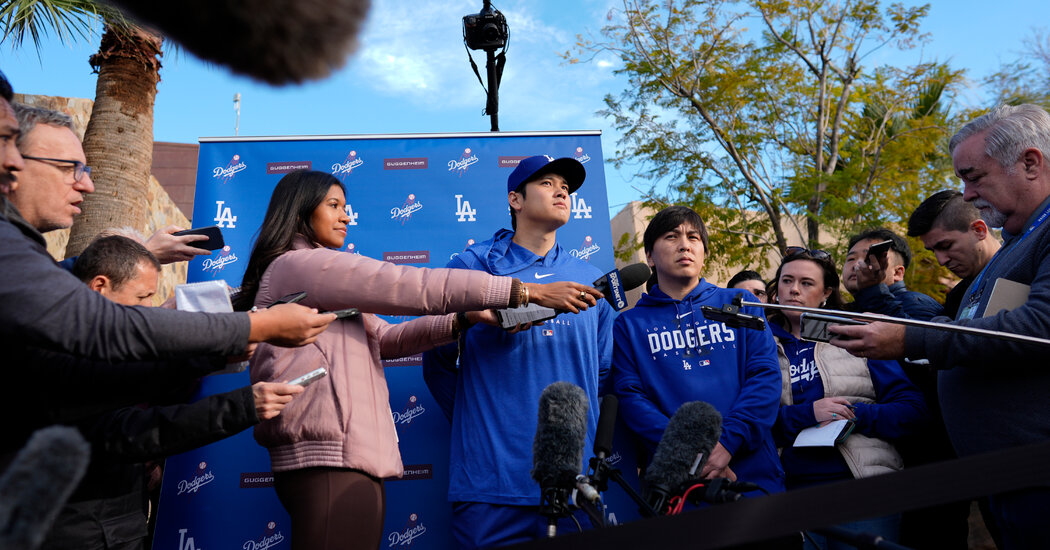Sports leagues of all shapes and sizes have barreled headfirst into gambling in the six years since the Supreme Court struck down a law that limited wagering on games to Nevada. Casting aside decades of resistance, professional leagues have taken millions of dollars from casinos and sports books that are spending heavily to lure new customers. Former no-go zones like Las Vegas are now free-for-alls; the National Football League even held the Super Bowl there last month.
Still, in a nod to the zero-tolerance policies that they once argued in court, the leagues continue to claim that their priority when dealing with gambling companies is protecting the integrity of their games. That means penalizing any players or coaches who bet on their sport and, in some cases, on any sport. Wagering on the games, the thinking goes, would give them incentive to affect the outcome in a potentially underhanded way, like shaving points.
The larger risk for the leagues, though, may come from people adjacent to the players and coaches. On Wednesday, reports surfaced that the interpreter for Shohei Ohtani, the Los Angeles Dodgers slugger and pitcher, was fired by the Dodgers after being accused of stealing millions of dollars from the player to place bets with an allegedly illegal bookmaker who is under federal investigation.
The details of the Ohtani situation remain very murky. But he and the interpreter, Ippei Mizuhara, have been close for years, and it raises the uncomfortable question of whether Mizuhara could have used inside knowledge about Ohtani to benefit his gambling. Who better to know, for instance, if the star had a sore knee or shoulder on the day he was scheduled to pitch?
A spokesman for Major League Baseball said the league was still gathering facts about the case.
Robert Williams, executive director of New York State Gaming Commission, said gambling by members of a player’s or team’s entourage using inside information was not only one of the biggest threats to the integrity of sporting events but one of the toughest to police.
“Where you’re going to have your issue is if a player’s first cousin twice removed or a friend knows something about injuries to a player or players — or, worse, somehow can influence a player’s performance, like missing a free throw,” Williams said. “I don’t think anyone is confident that we can catch all of that.”
Indeed, legal sports wagering is exploding, turning the task of tracking suspicious activity into a game of Whac-a-Mole. Americans legally bet nearly $120 billion on sports in 2023, according to the American Gaming Association. Nearly 25 million more Americans bet on sports last year than in 2018, the group said, and the number of states where betting on sports is legal will reach 38 this year.
California is one of the holdouts, which may be why Mizuhara would have potentially gone to an illegal bookmaker. Either way, Mizuhara is only the latest, and undoubtedly not the last, team or league employee to get entangled in gambling.
Last week, Amit Patel, who worked in the finance department at the Jacksonville Jaguars, was sentenced to six and a half years in jail for embezzling more than $22 million from the team. Patel used some of the money to place bets with online gambling websites, as well as to buy cryptocurrency, sports memorabilia and a country club membership.
The N.F.L., which had gone decades without any player gambling violations, penalized 10 players last season, including seven who served season-long bans for betting on N.F.L. games. But the league has also penalized about a dozen league employees, including two who were fired within the last two years for violating its gambling policies. One of the former employees said the firing was for betting less than $1,000 on the N.F.L. and other sports four years earlier, through a company that is now a league partner. The other employee said a main concern for the league seemed to be the potential for any debts to be used as leverage against the employee.
“We have to educate our personnel,” Commissioner Roger Goodell said last month in response to a question about people wondering if N.F.L. games were fixed. “That goes from owners to players to coaches to everybody in the organization, to everyone at the league level, to our partners, making sure that they understand while people can speculate, people can have perceptions, we have to hold that standard as high as we possibly can.”
Some experts argue that the professional athletes in the United States are so well paid that they have little motivation to take money to fix a contest. Yet inside information useful to gamblers can still filter out through other means
In April 2022, for example, a Professional Fighters League event that was marketed as if it were a live fight had been prerecorded. “We had sports books saying, ‘I don’t know what’s going on, but it feels like they’re betting the fights as if they knew who won,’” said Matt Holt, the founder of U.S. Integrity, which looks for unusual betting patterns on behalf of sports organizations.
Some sports books and state regulators froze betting on the event but not before incurring significant losses. It was later determined that someone within the league had broken its confidentiality agreement and told others of the outcomes of the fights. No known punishment, however, was handed down.
Tim Donaghy, an N.B.A. referee, began serving a 15-month prison term in 2008 for his involvement in a betting scheme in which he was paid to pick the winners of N.B.A. games and provide gamblers with inside information.
Sports books have spoken out, too, against what they perceive to be the use of inside information. Three days before the quarterback Tom Brady said in March 2022 that he was coming out of retirement to join the Tampa Bay Buccaneers, several large online wagers — $10,000 to $20,000 — were made on the Buccaneers to win the 2023 Super Bowl at odds of up to 60 to 1.
The bets were too big to be placed by random people acting on a hunch that a team with no clear quarterback would win the N.F.L. title, said Jay Kornegay, vice president of SuperBook, an online gambling company.
Whether that was true or not, it’s clear that the surge in gambling nationally is going to lead more questions about the boundaries between athletes and those with close access to them.
“I think you’d be insane to think that there isn’t going to be some scandal that relates to somebody attempting to influence an outcome of an event,” said Williams, the New York gaming commission executive. “There’s always individuals that are going to look to try to get an edge, whether it be legally or illegally.”
Rebecca R. Ruiz contributed reporting.

